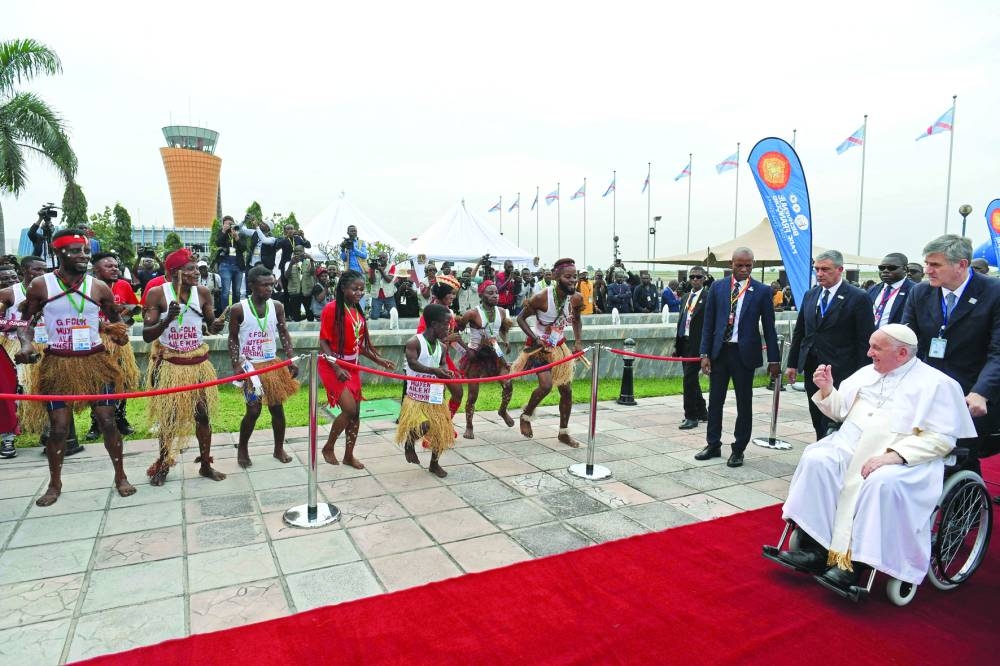Pope Francis denounced the “poison of greed” for mineral resources driving conflict in the Democratic Republic of the Congo (DR Congo) as he began a visit there yesterday, saying that the rich world could no longer ignore the tragic plight of many African nations.
The 86-year-old is the first Pontiff to visit the DR Congo since John Paul II in 1985, when it was still known as Zaire.
About half of the DR Congo’s population of 90mn are Roman Catholics.
Tens of thousands of people cheered as he travelled from the airport into the capital Kinshasa in his popemobile, with some breaking away to chase his convoy while others chanted and waved flags in one of the most vibrant welcomes of his foreign trips.
However, the mood changed when the Pope gave a speech to dignitaries at the presidential palace, condemning “terrible forms of exploitation, unworthy of humanity” in the DR Congo, where vast mineral wealth has fuelled war, displacement and hunger.
“It is a tragedy that these lands, and more generally the whole African continent, continue to endure various forms of exploitation,” Francis said.
“The poison of greed has smeared its diamonds with blood,” he said, referring to the Congo specifically.
“Political exploitation gave way to an economic colonialism that was equally enslaving,” Francis declared.
“As a result, this country, massively plundered, has not benefited adequately from its immense resources,” the Pope told the audience of Congolese politicians and other dignitaries, speaking in Italian.
“Hands off the Democratic Republic of the Congo! Hands off Africa! Stop choking Africa: it is not a mine to be stripped or a terrain to be plundered,” he said.
The DR Congo has some of the world’s richest deposits of diamonds, gold, copper, cobalt, tin, tantalum and lithium, but those have stoked conflict between militias, government troops and foreign invaders.
Mining has also been linked to inhumane exploitation of workers, including children, and environmental degradation.
About two-thirds of the population lives on less than $2.15 a day, according to the World Bank.
Compounding these problems, eastern DR Congo has been plagued by violence connected to the long and complex fallout from the 1994 genocide in neighbouring Rwanda.
The DR Congo accuses Rwanda of backing the M23 rebel group fighting government troops in the east.
Rwanda denies this.
“As well as armed militias, foreign powers hungry for the minerals in our soil commit, with the direct and cowardly support of our neighbour Rwanda, cruel atrocities,” said Congolese President Felix Tshisekedi, speaking just before the Pope and sharing a stage with him.
The Pope did not name Rwanda in his address or take sides in the dispute.
A spokesperson for the Rwandan government was not immediately available for comment.
An estimated 5.7mn people are internally displaced in the DR Congo and 26mn face severe hunger, largely because of the impact of armed conflict, according to the United Nations.
The Catholic Church plays a crucial role in running schools and health facilities in the DR Congo, as well as promoting democracy.
The Pope criticised rich countries for ignoring the tragedies unfolding in the DR Congo and elsewhere in Africa.
“One has the impression that the international community has practically resigned itself to the violence devouring it (the DR Congo). We cannot grow accustomed to the bloodshed that has marked this country for decades, causing millions of deaths,” he said.
Tshisekedi made a similar point in his own speech.
“While the international community has remained passive and silent, more than 10mn people have been horribly killed,” he said.
First scheduled for last July, the Pope’s trip was postponed because he was suffering a flare-up of a chronic knee ailment.
He had originally planned to travel to Goma, in eastern DR Congo, but that stop was scrapped because of a resurgence in fighting between M23 rebels and government troops.
In an apparent reference to the M23 and other militias active in the DR Congo’s eastern regions, the Pope said the Congolese people are fighting to preserve their territorial integrity “against deplorable attempts to fragment the country”.
Today Francis will celebrate Mass at a Kinshasa airport and meet victims of violence from the east, further highlighting the issues he raised in his speech.
Francis will stay in Kinshasa until Friday morning, when he will fly to South Sudan, another country grappling with conflict and poverty.
In a first, he will be accompanied for that leg of his journey by the Archbishop of Canterbury, leader of the global Anglican Communion, and by the Church of Scotland Moderator.
The religious leaders have described their joint visit as a “pilgrimage of peace”.

Pope Francis is greeted by dancers upon his arrival in Kinshasa.
